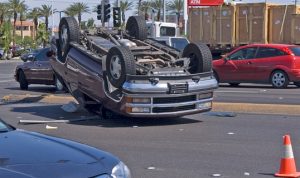 A tragic accident in New Mexico recently resulted in one death and one arrest. The accident was a rollover accident. Rollover collisions often cause serious or fatal injuries, with the severity of the injury determined in part by the extent of roof crush which occurs in the collision.
A tragic accident in New Mexico recently resulted in one death and one arrest. The accident was a rollover accident. Rollover collisions often cause serious or fatal injuries, with the severity of the injury determined in part by the extent of roof crush which occurs in the collision.
When a rollover collision causes injuries or death, victims or their families must determine who is to blame and how crash compensation may be provided. It is not uncommon for rollover accidents to be single vehicle crashes, but if and when a single vehicle rollover occurs, passengers may be able to pursue claims against the driver.
The recent New Mexico car accident, for example, resulted in a passenger death, likely because the driver failed to follow the rules of the road and best practices for safety.
The recent rollover accident was reported on by KRQE. It occurred on a Tuesday afternoon and involved a single car driven by a 29-year-old man. A law enforcement officer who responded to the collision scene indicated the car deviated out of its lane and crossed the roadway. The vehicle left the roady entirely, traveling down into an embankment. After going into the embankment, the car rolled over. The driver and the passenger were both ejected from the vehicle when it rolled.
The passenger in the car, who was 44, was pronounced dead at the scene of the collision, while the driver of the vehicle was injured and had to be transported to the hospital via ambulance. The driver was suspected of being intoxicated at the time when the vehicle rolled. He was subsequently arrested in connection with the accident and will likely face charges both for impaired driving and for causing the death of his passenger.
The accident which caused this tragedy is on of the most common kinds of rollover accidents: a single vehicle crash with a drunk driver. Rollover accidents also happen often when a driver speeds too fast, especially if the driver travels around a curve too quickly and loses control. Top heavy vehicles, such as SUVs, buses, and trucks are generally considered to be more likely to roll over when an accident happens; however, virtually any car can roll over under the right conditions.
Vehicle manufacturers have worked to improve roof strength in an effort to prevent rollover accidents from being deadly, but the inherent risk is great when motorists are in a car which tips over. The best way for drivers to prevent rollover accidents is to follow best practices for safety and to obey laws like speed limits. If drivers don't do this and they hurt their passengers or others on the road, they can be held legally accountable for losses which occur as a result of their actions.
